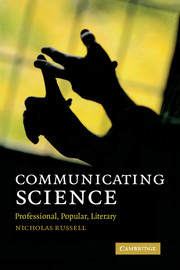Book contents
- Frontmatter
- Contents
- Introduction: What this book is about and why you might want to read it
- Prologue: Three orphans share a common paternity: professional science communication, popular journalism and literary fiction are not as separate as they seem
- Part I Professional science communication
- Part II Science for the public: what science do people need and how might they get it?
- 6 The public understanding of science (PUS) movement and its problems
- 7 Public engagement with science and technology (PEST): good principle, difficult practice
- 8 Citizen scientists? Democratic input into science policy
- 9 Teaching and learning science in school: implications for popular science communication
- Part III Popular science communication: the press and broadcasting
- Part IV The origins of science in cultural context: five historic dramas
- Part V Science in literature
- Index
- References
8 - Citizen scientists? Democratic input into science policy
Published online by Cambridge University Press: 02 December 2010
- Frontmatter
- Contents
- Introduction: What this book is about and why you might want to read it
- Prologue: Three orphans share a common paternity: professional science communication, popular journalism and literary fiction are not as separate as they seem
- Part I Professional science communication
- Part II Science for the public: what science do people need and how might they get it?
- 6 The public understanding of science (PUS) movement and its problems
- 7 Public engagement with science and technology (PEST): good principle, difficult practice
- 8 Citizen scientists? Democratic input into science policy
- 9 Teaching and learning science in school: implications for popular science communication
- Part III Popular science communication: the press and broadcasting
- Part IV The origins of science in cultural context: five historic dramas
- Part V Science in literature
- Index
- References
Summary
Several ‘ordinary people’ filed into a conference room in London in June 1998 and took their places behind a table separating them from media and academic folk occupying rows of seats. They were shepherded in by Dr Tom Wakeford, then of the University of East London, although he was careful not to speak too much at this press conference. As far as possible, presentations were given and questions answered by the people behind the table. We were witnessing an early example of a political device that has become more common in the twenty-first century; a citizens' jury. This one was convened to consider an issue with wide scientific implications; the future of food.
Tom Wakeford had facilitated the jury which was overseen for fairness by an advisory panel of stakeholders, representing a range of interest across the theme. The stakeholders were the Consumers' Association, the John Innes Food Research Centre, the National Farmers' Union, Sainsbury's, the Soil Association, the Transport and General Workers Union, and Whole Earth Foods. Attempts were made to find representatives from the biotechnology industry but apparently no one would take part.
The 12 jury members were chosen from people in a Brighton suburb, drawn from a pool of 2000 and offered £150 to participate in ten weekly deliberation sessions held in the function room of a local pub. Four principal technical witnesses for the jury to consult were chosen by the stakeholders. The jury called for three more witnesses. The jury's draft ideas were considered in an expert seminar of people appointed by the stakeholders. […]
- Type
- Chapter
- Information
- Communicating ScienceProfessional, Popular, Literary, pp. 99 - 115Publisher: Cambridge University PressPrint publication year: 2009



